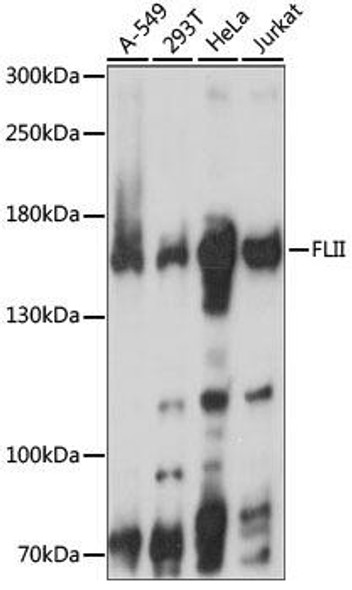Description
| Antibody Name: | Flii Antibody (PACO41958) |
| Antibody SKU: | PACO41958 |
| Size: | 50ug |
| Host Species: | Rabbit |
| Tested Applications: | ELISA |
| Recommended Dilutions: | |
| Species Reactivity: | Mouse |
| Immunogen: | Recombinant Mouse Protein flightless-1 homolog protein (495-827AA) |
| Form: | Liquid |
| Storage Buffer: | Preservative: 0.03% Proclin 300 Constituents: 50% Glycerol, 0.01M PBS, PH 7.4 |
| Purification Method: | >95%, Protein G purified |
| Clonality: | Polyclonal |
| Isotype: | IgG |
| Conjugate: | Non-conjugated |
| Background: | May play a role as coactivator in transcriptional activation by hormone-activated nuclear receptors (NR) and acts in cooperation with NCOA2 and CARM1. Involved in estrogen hormone signaling By similarity. Essential for early embryonic development. May play a role in regulation of cytoskeletal rearrangements involved in cytokinesis and cell migration, by inhibiting Rac1-dependent paxillin phosphorylation. |
| Synonyms: | Protein flightless-1 homolog, Flii, Fli1 Fliih |
| UniProt Protein Function: | FLI: May play a role as coactivator in transcriptional activation by hormone-activated nuclear receptors (NR) and acts in cooperation with NCOA2 and CARM1. Involved in estrogen hormone signaling. Involved in early embryonic development. May play a role in regulation of cytoskeletal rearrangements involved in cytokinesis and cell migration. Deletion of the FLII gene may be a cause of Smith-Magenis syndrome (SMS). It is a contiguous gene deletion syndrome involving developmental abnormalities and mental retardation. The spectrum of clinical findings includes short stature, brachydactyly, developmental delay, dysmorphic features, sleep disturbances, and behavioral problems.Protein type: Nuclear receptor co-regulator; Actin-bindingCellular Component: brush border; cell junction; cytoplasm; cytoskeleton; microtubule organizing center; nucleoplasm; nucleusMolecular Function: actin binding; protein bindingBiological Process: actin cytoskeleton organization and biogenesis; actin filament severing; multicellular organismal development; regulation of transcription, DNA-dependent; transcription, DNA-dependent |
| UniProt Protein Details: | |
| NCBI Summary: | This gene encodes a protein with gelsolin-like repeats and an N-terminal leucine-rich repeat domain. The protein is similar to a Drosophila protein involved in early embryogenesis and the structural organization of indirect flight muscle. This protein may act as an actin-remodelling protein as well as a transcriptional coactivator. Homozygous knockout mice show embryonic lethality. This protein may act to regulate wound repair. Alternative splicing results in multiple transcript variants encoding different isoforms. [provided by RefSeq, Oct 2014] |
| UniProt Code: | Q9JJ28 |
| NCBI GenInfo Identifier: | 11528490 |
| NCBI Gene ID: | 14248 |
| NCBI Accession: | NP_071292.1 |
| UniProt Secondary Accession: | Q9JJ28,Q8K095, Q8VI44 |
| UniProt Related Accession: | Q9JJ28 |
| Molecular Weight: | 144,803 Da |
| NCBI Full Name: | protein flightless-1 homolog isoform 1 |
| NCBI Synonym Full Names: | flightless I actin binding protein |
| NCBI Official Symbol: | Flii |
| NCBI Official Synonym Symbols: | Fliih; 3632430F08Rik |
| NCBI Protein Information: | protein flightless-1 homolog |
| UniProt Protein Name: | Protein flightless-1 homolog |
| UniProt Synonym Protein Names: | |
| Protein Family: | Protein flightless |
| UniProt Gene Name: | Flii |
| UniProt Entry Name: | FLII_MOUSE |






